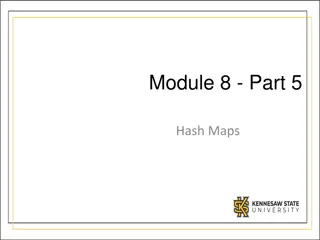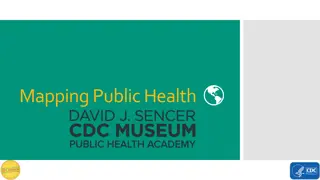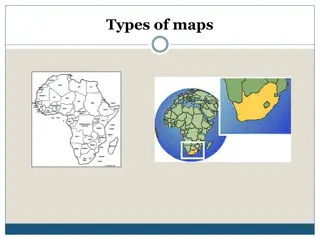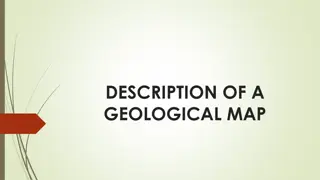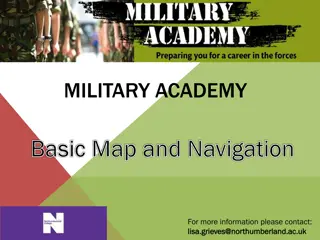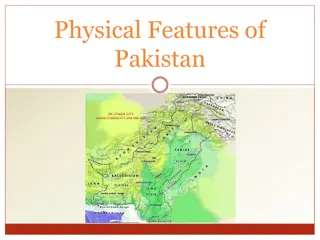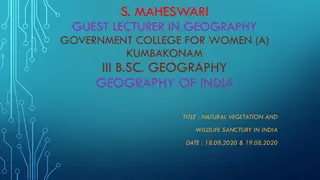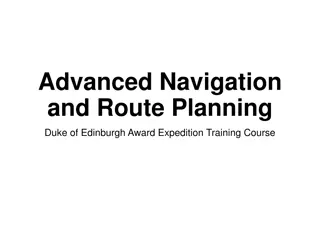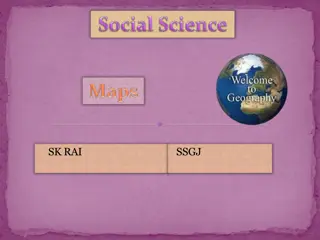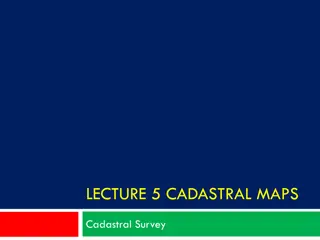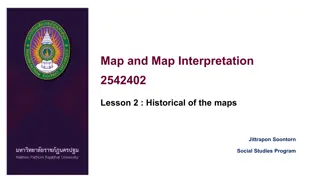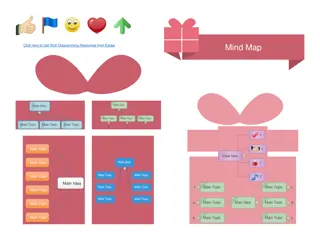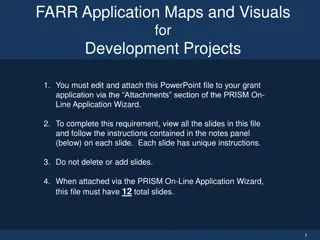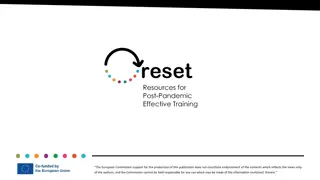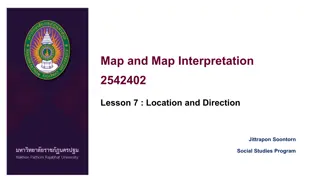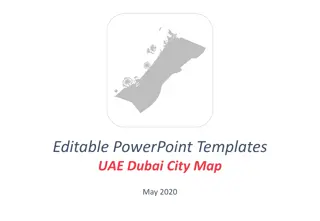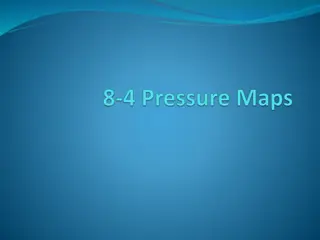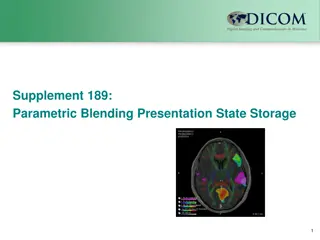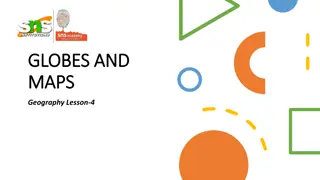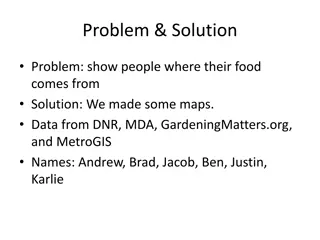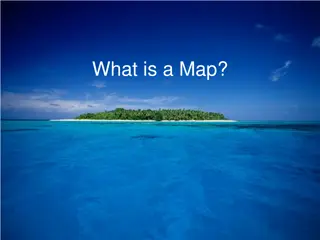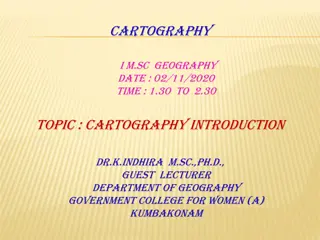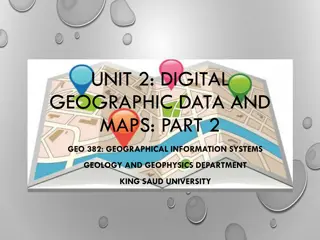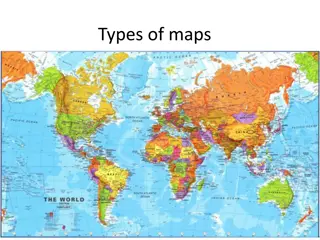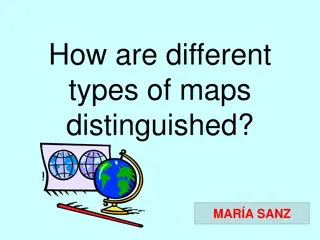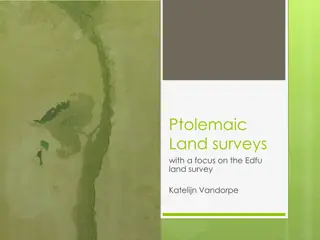Weather Map Interpretation
Weather maps provide data on various weather elements at a specific time. They show isobars, wind direction, cloud cover, rainfall, and more. Weather maps differ from synoptic charts which provide additional detailed information. Analyzing weather maps helps predict weather trends.
6 views • 7 slides
❤Book⚡[PDF]✔ Star Maps: History, Artistry, and Cartography (Springer Praxis Book
\"COPY LINK HERE ; https:\/\/getpdf.readbooks.link\/3030136124\n\n[READ DOWNLOAD] Star Maps: History, Artistry, and Cartography (Springer Praxis Books) | Star Maps: History, Artistry, and Cartography (Springer Praxis Books)\n\"\n
0 views • 6 slides
Understanding Hash Maps: A Common Data Structure
In this module, learn about Hash Maps, a common data structure used in various programming languages like Java, C#, C++, Python, and PHP. Hash Maps allow you to store key-value pairs without duplicate keys, making it efficient for mapping relationships between data elements. Explore how to declare,
6 views • 16 slides
Exploring Nordic and European Countries Through Maps
Discover the beauty and diversity of Nordic and European countries through a series of detailed maps showcasing countries like Greenland, Finland, Norway, Sweden, Iceland, and many others. From the stunning landscapes of Scandinavia to the rich cultural heritage of Central Europe, these maps offer a
2 views • 13 slides
Strategy Maps
Strategy maps provide a visual representation of how organizations can create value by aligning strategic objectives in a cause-and-effect relationship based on the Balanced Scorecard perspectives. They help monitor progress towards strategic goals through objectives, measures, targets, and initiati
0 views • 19 slides
Understanding the Use of Maps in Public Health
Maps play a crucial role in public health by visualizing health data, trends, and locations of health events. They are used to communicate information such as disease rates, outbreaks, and causal factors. Spot maps show individual case locations, while area maps use colors or shades to communicate t
0 views • 15 slides
Eight Types of Maps and Their Uses in Tourism
Explore eight different types of maps and how they are utilized in the tourism industry. From general reference maps to political maps, each type serves a specific purpose in providing valuable information to tourists for better navigation and understanding of different areas. Learn about electronic
0 views • 21 slides
Understanding Geological Maps: Interpretation and Description
Training in geological map interpretation aims to accurately identify features depicted on maps through careful examination of geological information. The description of a geological map involves a chronological synthesis of geological data, analysis of the geology of an area focusing on relief, suc
0 views • 15 slides
Military Academy Map and Navigation Presentation
This presentation introduces basic map reading and navigation skills essential for Military Academy students. It covers various types of maps, map symbols, measuring distance, and understanding topographical features like physical and man-made elements. Navigation is highlighted as a critical skill
0 views • 18 slides
Physical Geography of Pakistan: Mountains, Plains, Plateaus, and Deserts
Pakistan's diverse physical features include towering mountains like the Karakoram and Himalayas, expansive plains, elevated plateaus, and vast deserts. The country shares borders with China, India, Iran, Afghanistan, and the Arabian Sea. The Northern Mountains consist of distinct ranges like the Ka
1 views • 29 slides
Natural Vegetation and Wildlife Sanctuaries in India
The natural vegetation in India varies based on climatic and topographical factors, leading to diverse flora such as Evergreen Rain Forests, Monsoon Deciduous Forests, and Desert ecosystems. The Himalayas showcase vegetation changes with altitude, while factors like soil and topography influence veg
2 views • 39 slides
Advanced Navigation and Route Planning for Duke of Edinburgh Award Expedition Training Course
Learn advanced map and compass skills essential for Duke of Edinburgh Silver Award expeditions. Discover how to read topographical maps, navigate using contours, understand map scale, and interpret map symbols to enhance your outdoor experience.
0 views • 15 slides
Understanding Different Types of Maps and Their Uses
Learn about the advantages and limitations of using a globe versus maps for studying the earth, as well as the various types of maps like Physical, Political, Thematic, Sketch, and Plan maps. Each type serves a specific purpose, from showing natural features to detailed information on cities, towns,
0 views • 11 slides
Understanding Cadastral Mapping Components and Data Sources
Cadastral mapping involves geodetic control networks, parcel identification, and various overlays like zoning and floodplains. City maps are categorized into base, derived, and thematic maps. Data sources include spatial and non-spatial data for property assessment. Layers in cadastral maps cover to
1 views • 16 slides
Unlocking Global Talent Recruitment Success
Global talent recruitment includes obtaining, drawing in, and recruiting people from around the globe to satisfy explicit jobs inside an association. It requires an essential methodology that rises above topographical limits, social contrasts, and ad
1 views • 6 slides
Principles of Satellite Communications in Engineering
Explore the history and fundamentals of satellite communications, including the evolution from the first artificial satellite, Sputnik, to modern active and passive satellite systems. Learn about communication via satellites as microwave repeater stations, bridging distances and optimizing frequenci
0 views • 13 slides
Understanding the Common Integuments and Skin Anatomy
The common integuments encompass the skin, hairs, skin glands, claws, hooves, and horns, playing vital roles in protection, thermoregulation, and drug administration. The skin's structure consists of the epidermis and dermis layers, renewing continuously to maintain its functions. Additionally, nail
0 views • 11 slides
Evolution of Maps Through History: A Detailed Exploration
Discover the fascinating journey of maps from ancient times to the present day, highlighting the evolution of map-making techniques, the significance of spatial data recording, and the role of maps in shaping geographical understanding across different eras. Explore the transitions in mapping method
0 views • 26 slides
Harnessing the Power of Mind Maps for Enhanced Productivity
Explore the rich resources, benefits, and applications of mind mapping tools like Edraw. From defining mind maps to providing examples in education, learn how to visualize, organize, and boost creativity through effective diagramming. Discover rules, tips, and techniques for creating impactful mind
0 views • 11 slides
Grant Application Maps and Visuals for Development Projects
This PowerPoint file contains maps and visual representations essential for a grant application. It includes location maps, facility layouts, site plans, and floor plans among other visuals to enhance the understanding of the proposed development project.
0 views • 12 slides
Dating Topography of the Sierra Nevada, California with Apatite (U-Th)/He Ages
Utilizing apatite (U-Th)/He ages, this study explores the topography of the Sierra Nevada in California. By analyzing age variations between ridges and valleys, researchers estimate the timing of incision and total relief of the mountain range. Results suggest minimum age of river incision as 70-80
0 views • 8 slides
Understanding Mind Maps: Classroom Management and Learning Outcomes
Explore the concept of mind maps in virtual classrooms, learn about their features and applications, and understand the differences between mind maps and concept maps. Discover how to keep the audience engaged, gather ideas effectively, and enhance professional engagement. The European Commission do
0 views • 42 slides
Understanding Website Navigation and Site Maps
Website navigation and site maps are essential components for professional web applications with numerous pages. Response.Redirect() and Server.Transfer() methods are useful for page navigation, but for complex applications, creating a site map using ASP.NET's XMLSiteMapProvider is recommended. The
0 views • 13 slides
Understanding Location and Direction on Maps
Location and Direction are essential aspects of reading maps. Traditional methods use relative location descriptions, while modern approaches incorporate absolute coordinates. Maps utilize coordinate systems like Geographic Coordinate System (GCS) and Universal Transverse Mercator System (UTM) to pi
0 views • 30 slides
Comprehensive Collection of Dubai City Maps for May 2020
Explore a diverse range of Dubai city maps including editable PowerPoint templates, outline maps, sector maps, maps with sectors and districts, as well as blank framed maps. These maps cover various sectors and districts of Dubai, providing detailed insights and information for a comprehensive under
0 views • 19 slides
Understanding Air Pressure Through Pressure Maps
Explore the significance of air pressure in understanding weather patterns through pressure maps. Learn to interpret isobars, identify high and low pressure areas, analyze isobar intervals, and understand how air flows from high to low pressure areas. Enhance your meteorological knowledge and grasp
0 views • 6 slides
Insights from Yale Climate Opinion Maps 2021
Explore key findings from the Yale Climate Opinion Maps 2021, revealing percentages of adults' beliefs on global warming, future impacts, discussions, and opinions on actions needed to address climate change. The maps depict varying views on global warming awareness, personal concerns, governmental
0 views • 16 slides
Understanding Parametric Blending Presentation State Storage
Explore the concept of Parametric Blending Presentation State Storage, which allows showcasing spatial relationships between parametric maps and structural images while retaining usability. This innovative method involves blending different data sets, applying thresholds, and highlighting important
0 views • 20 slides
Understanding Geography: Maps, Globes, and Map Scales
Explore the world of geography through maps and globes in this informative lesson. Discover the advantages and disadvantages of using globes and maps, learn about different types of maps, and understand the importance of measuring distance and map scales. Dive into the realm of conventional signs an
0 views • 13 slides
Exploring Minnesota's Food Sources Through Interactive Maps
Discover where your food comes from in Minnesota through interactive maps created using data from various organizations. From wild rice in the wild to community gardens and farmers markets, these maps showcase the diverse sources of food in the state. Explore the green community gardens and yellow f
0 views • 6 slides
Essential Rules and Tips for Creating Quality Maps
Understanding what a map is, the rules of mapping, key features that should be included on maps (BOLTS), and essential tips for creating tasteful and easy-to-read maps. Guidelines include labeling in pencil first, horizontal labeling for human features, following natural directions for physical feat
0 views • 14 slides
Understanding Cartography: The Art and Science of Mapmaking
Cartography, or mapmaking, entails the study and practice of creating maps by combining scientific and artistic elements. Cartographers play a vital role in researching, designing, and manipulating data to produce various types of maps, such as political, physical, and topographic maps. Understandin
0 views • 9 slides
Introduction to Digital Geographic Data and Maps in GIS
Understanding digital maps and GIS involves recognizing their dynamic nature and the role of computing technology. Digital maps offer flexibility and scalability unlike traditional hardcopy maps. This introduction delves into the fundamental concepts of digital maps, emphasizing the storage of data
0 views • 35 slides
Exploring San Francisco History Online
Dive into the fascinating history of San Francisco through online resources like maps, photography, and dedicated monuments. Discover valuable information about your house, neighborhood, and the city in 1905. Explore census data, architectural archives, and topographical maps to uncover the rich her
0 views • 11 slides
Anatomy Written Tests Overview with Sample Questions
Explore different types of anatomy questions commonly seen in written tests, including general anatomy, structural anatomy, functional anatomy, topographical anatomy, imaging anatomy, clinical anatomy, microscopic anatomy, and embryo-related topics. Sample questions and answers are provided for each
0 views • 12 slides
Understanding Sets, Maps, and Map Methods
Explore the concepts of sets, maps, and map methods in programming, focusing on efficient operations like adding, removing, and searching for values. Sets allow unique values with no duplicates, while maps hold key-value pairs like a dictionary. Map methods provide functions for manipulating mapping
0 views • 5 slides
Ancient Maps and Alignments: A Journey Through History
Explore a collection of ancient maps and alignments, from Sumerian maps dating back to 1500 B.C. to the precise compass orientation of the Great Pyramid of Giza. Delve into the mysteries of the underworld as painted on an Egyptian coffin from 2000 B.C. Witness the evolution of cartography with the f
0 views • 6 slides
Exploring Different Types of Maps and Their Uses
Learn about various types of maps such as thematic, choropleth, isopleth, raised relief, topographic, political, contour-line, natural resource, military, bird's-eye view, artifact, satellite photograph, pictograph, and weather maps. Understand how to read maps and the significance of thematic maps
0 views • 15 slides
Understanding Various Types of Maps
Political maps use colors and symbols to represent countries, regions, and physical features. Physical maps highlight natural patterns and features like vegetation and mountains. Climate maps depict weather patterns, and land use maps show how land is utilized. Contour maps display elevation through
0 views • 18 slides
Ptolemaic Land Surveys: Insights from Edfu Survey and Related Operations
Explore the intricacies of Ptolemaic land surveys, with a focus on the Edfu land survey conducted by Katelijn Vandorpe. Delve into main survey operations such as cadastral surveys and crop reports, discuss nome surveys at village levels, and analyze topographical land surveys highlighting personal d
0 views • 16 slides

![❤Book⚡[PDF]✔ Star Maps: History, Artistry, and Cartography (Springer Praxis Book](/thumb/21625/book-pdf-star-maps-history-artistry-and-cartography-springer-praxis-book.jpg)
